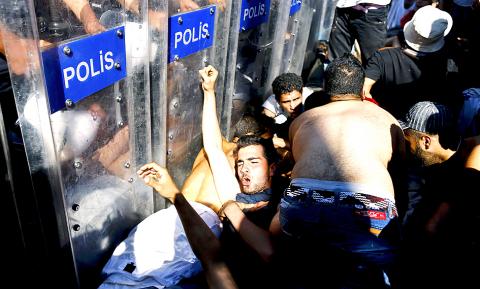Thousands of refugees yesterday flooded into Austria, seeking shelter after shuttling for days in bordering nations that were unable or unwilling to help.
Austrian police said that about 6,700 people traveled to the central European country from Hungary after being trapped on Friday in a vicious tug-of-war as bickering European governments shut border crossings, blocked bridges and erected new barbed-wire fences in a bid to shut down the flow.
More are expected as people continue to make their way north via Turkey and Greece after fleeing conflict and poverty in the Middle East and Africa.

Photo: Reuters
The Greek coast guard said they failed to save a five-year-old girl found in the sea off the island of Lesbos after the boat she traveled on sank, also leaving 14 others missing.
Asylum seekers who headed westward into Croatia after being beaten back by tear gas and water cannons on the Hungarian-Serbian border just days earlier found themselves being returned to Serbia or to Hungary, after Croatia declared it could not handle the influx.
Hungary then put them on buses and sent them on to Austria. More were expected.
Hungary’s military said that it is calling up 500 army reservists as the nation reinforces its borders with razor-wire fences, the deployment of thousands of soldiers to the border and other measures.
The EU’s failure to find a unified response to the crisis left Croatia, one of the poorest countries in the EU, squeezed between the blockades thrown up by Hungary and Slovenia and the unending flood of people flowing north from Syria, Iraq and Afghanistan.
Though sympathetic to their plight, Croatian President Kolinda Grabar Kitarovic demanded that the EU step forward and take responsibility for the people in transit through the country of 4.2 million.
“We’re flooded, local communities are flooded, the numbers of refugees in some areas is far greater [than] the number of local residents,” Kitarovic told reporters. “So we need to control, we need to stop the flow, we need to get reassurances from European Union what happens to these people who are already in Croatia, and those who still want to transit through Croatia.”
Mindful of people crossing cornfields and forests to transit her country, Kitarovic said that further measures would be taken to secure Croatia’s borders. Underscoring that Croatia itself has only recently begun to recover from the Balkan wars of the 1990s, Kitarovic said that migrants were also in danger of stepping on mines left over from the conflict.
“I will advise highly anyone to use official crossings, but we have to take further measures to insure stability on the border, and that there are no breaches through the corn fields, or forests or any other areas that are not controlled or cleared,” she said.
The thousands seeking sanctuary as doors close behind them are camping in the open.
Police in Slovenia say more than 1,000 migrants have entered the country, but hundreds more are waiting at the border as they let in only limited numbers.

The US government has signed defense cooperation agreements with Japan and the Philippines to boost the deterrence capabilities of countries in the first island chain, a report by the National Security Bureau (NSB) showed. The main countries on the first island chain include the two nations and Taiwan. The bureau is to present the report at a meeting of the legislature’s Foreign Affairs and National Defense Committee tomorrow. The US military has deployed Typhon missile systems to Japan’s Yamaguchi Prefecture and Zambales province in the Philippines during their joint military exercises. It has also installed NMESIS anti-ship systems in Japan’s Okinawa

‘WIN-WIN’: The Philippines, and central and eastern European countries are important potential drone cooperation partners, Minister of Foreign Affairs Lin Chia-lung said Minister of Foreign Affairs Lin Chia-lung (林佳龍) in an interview published yesterday confirmed that there are joint ventures between Taiwan and Poland in the drone industry. Lin made the remark in an exclusive interview with the Chinese-language Liberty Times (the Taipei Times’ sister paper). The government-backed Taiwan Excellence Drone International Business Opportunities Alliance and the Polish Chamber of Unmanned Systems on Wednesday last week signed a memorandum of understanding in Poland to develop a “non-China” supply chain for drones and work together on key technologies. Asked if Taiwan prioritized Poland among central and eastern European countries in drone collaboration, Lin

ON ALERT: Taiwan’s partners would issue warnings if China attempted to use Interpol to target Taiwanese, and the global body has mechanisms to prevent it, an official said China has stationed two to four people specializing in Taiwan affairs at its embassies in several democratic countries to monitor and harass Taiwanese, actions that the host nations would not tolerate, National Security Bureau (NSB) Director-General Tsai Ming-yen (蔡明彥) said yesterday. Tsai made the comments at a meeting of the legislature’s Foreign Affairs and National Defense Committee, which asked him and Minister of National Defense Wellington Koo (顧立雄) to report on potential conflicts in the Taiwan Strait and military preparedness. Democratic Progressive Party (DPP) Legislator Michelle Lin (林楚茵) expressed concern that Beijing has posted personnel from China’s Taiwan Affairs Office to its

BACK TO WORK? Prosecutors said they are considering filing an appeal, while the Hsinchu City Government said it has applied for Ann Kao’s reinstatement as mayor The High Court yesterday found suspended Hsinchu mayor Ann Kao (高虹安) not guilty of embezzling assistant fees, reducing her sentence to six months in prison commutable to a fine from seven years and four months. The verdict acquitted Kao of the corruption charge, but found her guilty of causing a public official to commit document forgery. The High Prosecutors’ Office said it is reviewing the ruling and considering whether to file an appeal. The Taipei District Court in July last year sentenced Kao to seven years and four months in prison, along with a four-year deprivation of civil rights, for contravening the Anti-Corruption